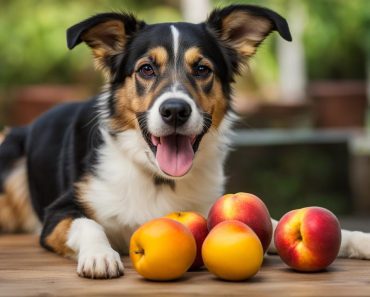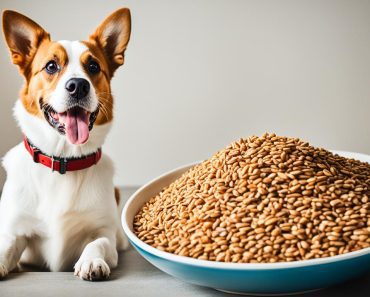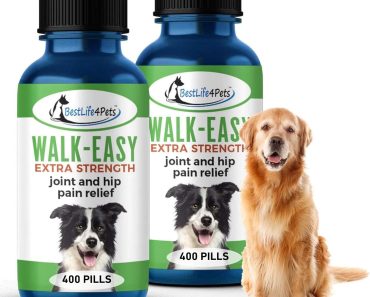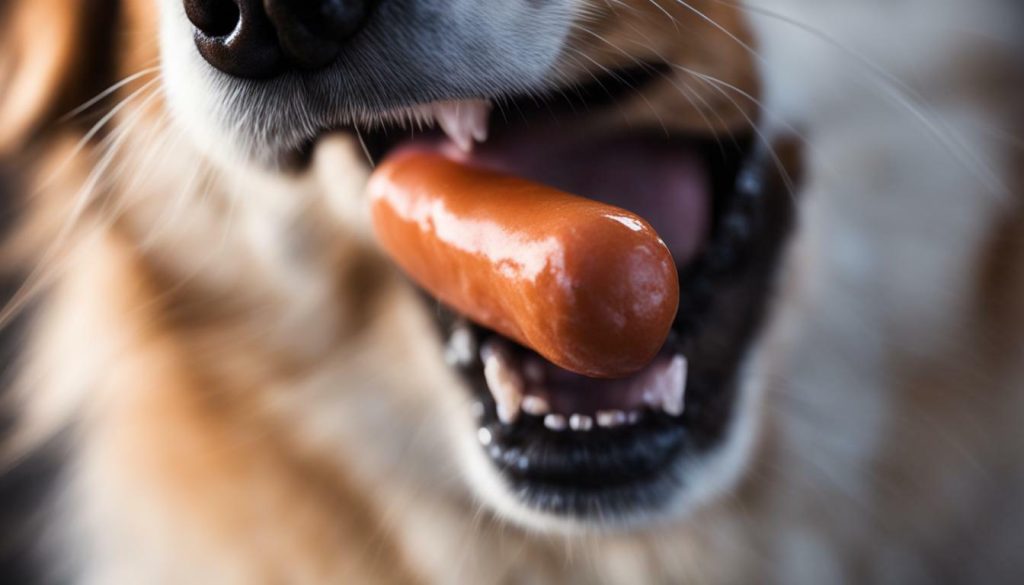
If you’re wondering whether it’s safe for dogs to consume Vienna sausages, there are a few important factors to consider. While these small, canned sausages may seem convenient for your furry friend, they are not the healthiest option for dogs. Vienna sausages can pose potential risks to a dog’s health due to their ingredients and high sodium, preservative, fat, and calorie content.
Key Takeaways:
- Vienna sausages are unsafe for dogs due to potentially toxic ingredients like garlic powder and onion powder.
- The high sodium content in Vienna sausages can lead to dehydration and bloating in dogs.
- Preservatives and additives in these sausages can contribute to various health problems in dogs, including heart disease.
- Vienna sausages’ high fat and calorie content can increase the risk of weight gain and organ-related illnesses in dogs.
- It is recommended to feed dogs healthier meat options such as chicken, turkey, beef roast, and lean ground beef.
As responsible pet owners, it is crucial to research and understand which foods are safe for our dogs to consume. While sharing our favorite foods with them may be tempting, avoiding giving them Vienna sausages or other unhealthy human foods is best. We can ensure their overall well-being and happiness by prioritizing their health and providing a balanced and nutritious diet.
Why Vienna Sausages are Not Safe for Dogs
Despite their appeal to us humans, Vienna sausages pose several risks to a dog’s well-being. These sausages may contain toxic ingredients such as garlic powder or onion powder, which can harm dogs. Additionally, Vienna sausages are high in sodium, which can lead to dehydration and bloating in our furry friends.
Vienna sausages are potentially harmful due to their ingredients packed with preservatives and additives that can negatively affect a dog’s health. These additives are commonly used to extend the shelf life of processed meats but can contribute to health problems like heart disease in dogs.
Furthermore, Vienna sausages are high in fat and calories, which can harm a dog’s overall well-being. Consuming these sausages can lead to weight gain, putting the dog at risk for obesity and related health issues. Pet owners must be mindful of their dog’s diet and choose healthier meat options.
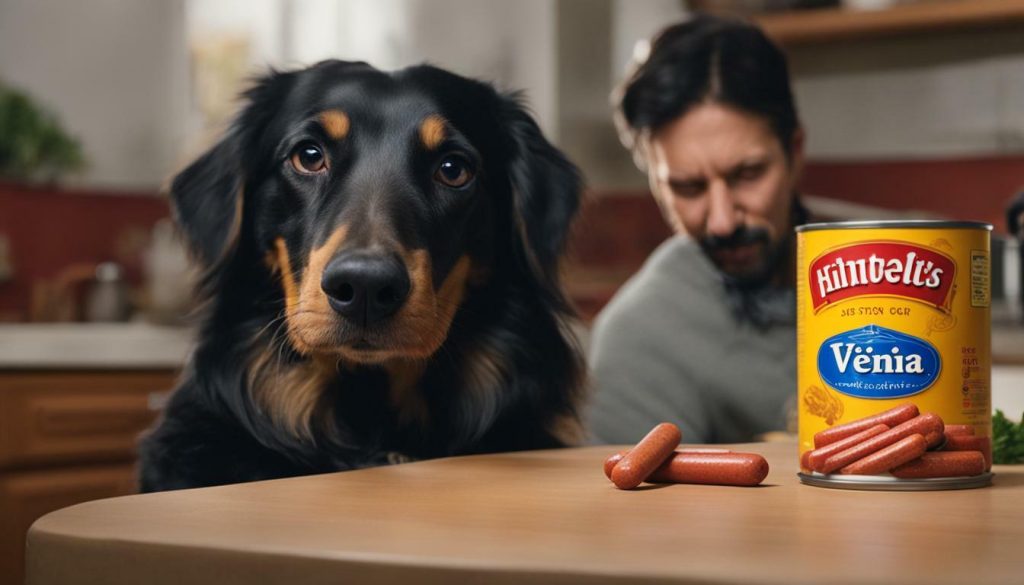
Feeding our canine companions a balanced and nutritious diet is essential for their health. Instead of giving them Vienna sausages, pet owners should consider offering healthier alternatives such as chicken, turkey, beef roast, or lean ground beef. These options provide dogs with the necessary nutrients without the risks associated with processed meats.
In conclusion, while Vienna sausages may be a convenient and tasty snack for humans, they are unsafe for dogs. Their potentially toxic ingredients, high sodium content, preservatives and additives, and high fat and calorie levels make them unsuitable for canine consumption. Responsible pet owners should prioritize their dog’s health by choosing healthier meat options and avoiding unhealthy human foods like Vienna sausages.
The Impact of Sodium and Preservatives on Dogs
When it comes to Vienna sausages and dogs, the high sodium content and presence of preservatives can have detrimental effects on their health. These sausages are often loaded with sodium, which can lead to dehydration and bloating in dogs. Excessive sodium intake can disrupt the balance of electrolytes in a dog’s body, causing electrolyte imbalances and potentially leading to serious health issues.
In addition to sodium, Vienna sausages may contain preservatives and additives that can harm dogs. Some additives, such as nitrates and nitrites, have been linked to an increased risk of certain health conditions, including heart disease. Consuming Vienna sausages regularly can increase your dog’s risk of developing these conditions over time.
To illustrate the impact of sodium and preservatives, consider the following table:
| Health Issues | Impact |
|---|---|
| Dehydration | High sodium content can lead to increased thirst and dehydration in dogs. |
| Bloating | Excessive sodium intake can cause bloating and discomfort in dogs. |
| Electrolyte Imbalances | High sodium levels can disrupt the balance of electrolytes in a dog’s body, leading to various health problems. |
| Increased Risk of Heart Disease | The preservatives and additives in Vienna sausages have been linked to an increased risk of heart disease in dogs. |
It is essential to prioritize your dog’s health by providing a balanced and nutritious diet. Instead of feeding them Vienna sausages, consider healthier meat options such as chicken, turkey, beef roast, or lean ground beef. These alternatives provide essential nutrients while minimizing the risks associated with sodium, preservatives, and high-fat content.
Responsible pet ownership includes being mindful of what you feed your dog. Always research and understand which foods are safe to consume, and avoid giving them unhealthy human foods like Vienna sausages. By making informed choices about your dog’s diet, you can help ensure their overall well-being and longevity.
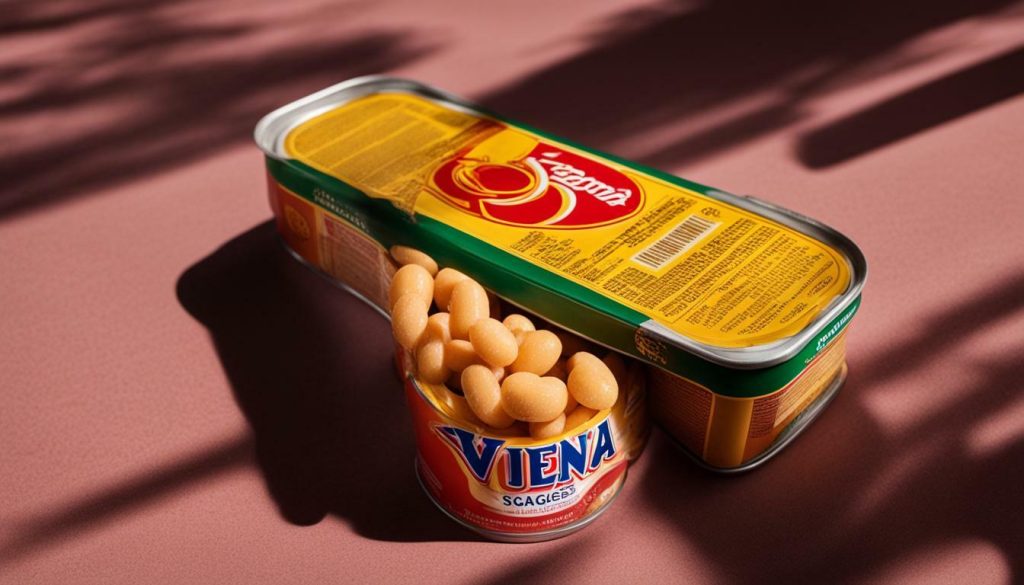
The abundance of fat and calories in Vienna sausages can harm a dog’s health, potentially leading to weight gain and various organ-related illnesses. Dogs have different nutritional needs than humans, and a diet high in fat and calories can negatively affect their overall well-being.
When dogs consume Vienna sausages regularly, the excess fat and calories can contribute to weight gain. Obesity in dogs can lead to a range of health issues, including joint problems, heart disease, and diabetes. Monitoring a dog’s diet and ensuring they receive the appropriate amount of calories to maintain a healthy weight is important.
Additionally, the high-fat content in Vienna sausages can strain a dog’s organs. The excess fat can lead to plaque buildup in the arteries, increasing the risk of heart disease and other cardiovascular problems. Furthermore, the liver and pancreas may also be affected, potentially resulting in conditions like pancreatitis or liver disease.
| Fat Content | Calories per Serving | |
|---|---|---|
| Vienna Sausages | 15g | 160 |
| Chicken Breast | 3g | 165 |
| Turkey Breast | 0.5g | 120 |
Pet owners must know the risks of Vienna sausages’ high fat and calorie content. Instead, opt for healthier meat options like chicken breast or turkey breast, which have significantly lower fat content and provide essential nutrients for dogs. By making informed choices about their dog’s diet, pet owners can promote their furry friend’s overall health and well-being.
References:
- American Kennel Club. “Obesity in Dogs: A Growing Epidemic.” Retrieved from https://www.akc.org/dog-breeds/health/obesity-in-dogs/
- Nestlé Purina. “Special Dietary Considerations for Overweight Dogs.” Retrieved from https://www.purina.co.uk/dogs/health-and-nutrition/symptoms-to-watch-out-for/diets-for-overweight-dogs
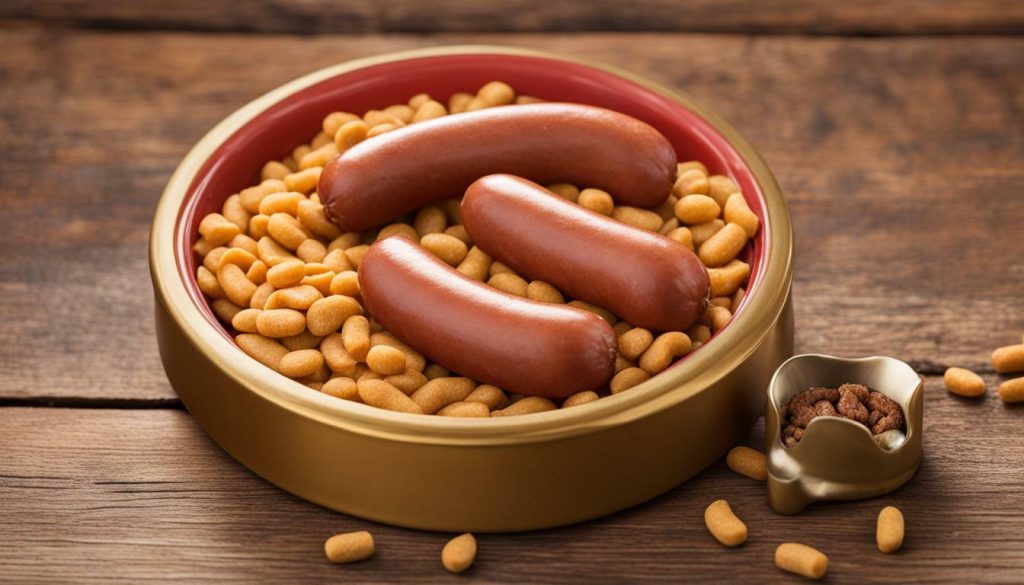
Instead of Vienna sausages, there are several healthier and dog-friendly meat options that you can include in your furry friend’s diet. These alternatives provide essential nutrients without the potential risks associated with processed sausages. Here are some meat options that are both safe and beneficial for your dog:
- Chicken: Cooked chicken is a lean and protein-rich option for dogs. Remember to remove the skin and bones before serving.
- Turkey: Like chicken, turkey is another lean protein source that can add greatly to your dog’s diet. Ensure it is cooked thoroughly, and avoid seasoning with harmful ingredients.
- Beef Roast: Cooked beef roast, such as a tenderloin or sirloin, can provide your dog with high-quality protein. Trim off excess fat and avoid using any seasonings that might harm dogs.
- Lean Ground Beef: Ground beef with a low-fat content can be a tasty and nutritious option for your dog. Remember to cook it thoroughly to eliminate any potential bacteria.
These meat options can be served as a standalone meal or mixed with your dog’s regular kibble for added variety and taste. It is important to ensure that the meat is cooked properly to avoid the risk of harmful bacteria. Also, remember to introduce new foods gradually and monitor your dog’s reaction to ensure they tolerate them well.
Providing your dog with a well-balanced diet with various safe and nutritious meat options is essential for their overall health and well-being. By making informed choices about their diet, you can help keep your furry friend happy and thriving.
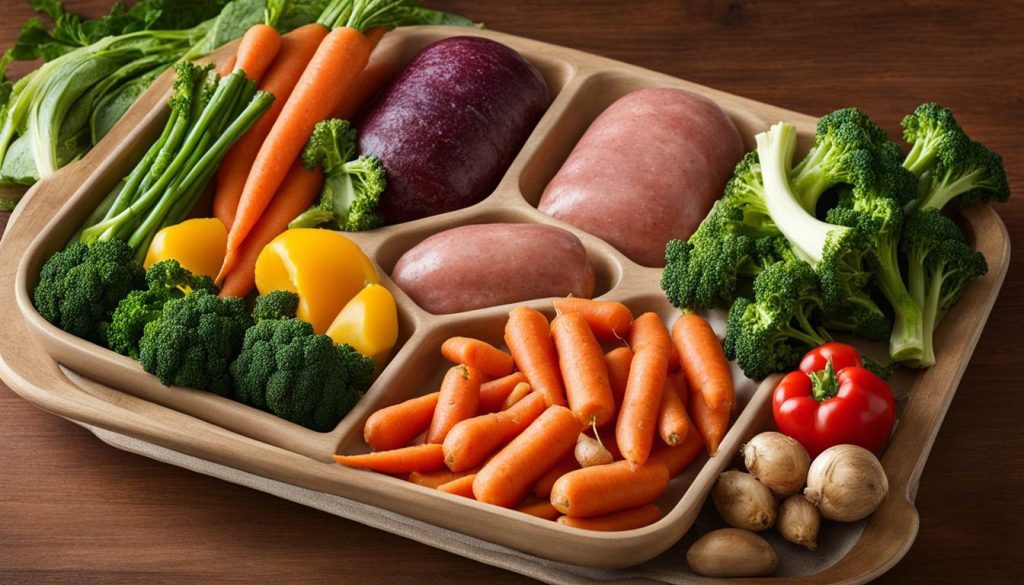
| Meat Options | Protein Content | Fat Content | Calories (per 100g) |
|---|---|---|---|
| Chicken | 31g | 3.6g | 165 |
| Turkey | 29g | 1.7g | 125 |
| Beef Roast | 26g | 7.9g | 250 |
| Lean Ground Beef | 26g | 9.3g | 250 |
Responsible Pet Ownership
As a responsible pet owner, educating yourself about what foods are safe and healthy for your beloved canine companion is crucial. It’s important to understand that Vienna sausages are unsuitable for dogs. These sausages often contain toxic ingredients such as garlic powder or onion powder, which can harm dogs. Additionally, Vienna sausages are high in sodium, which can lead to dehydration and bloating in dogs.
Furthermore, Vienna sausages may contain preservatives and additives that can negatively affect a dog’s health. These additives have been linked to various dog health problems, including heart disease. Additionally, Vienna sausages’ high fat and calorie content can contribute to weight gain and increase the risk of organ-related illnesses in dogs.
Instead of feeding your dog Vienna sausages, healthier meat options are recommended. Foods such as chicken, turkey, beef roast, and lean ground beef can give your dog the necessary nutrients without the risks associated with Vienna sausages. By prioritizing your dog’s health and making informed choices about their diet, you can ensure that they lead a happy and healthy life.
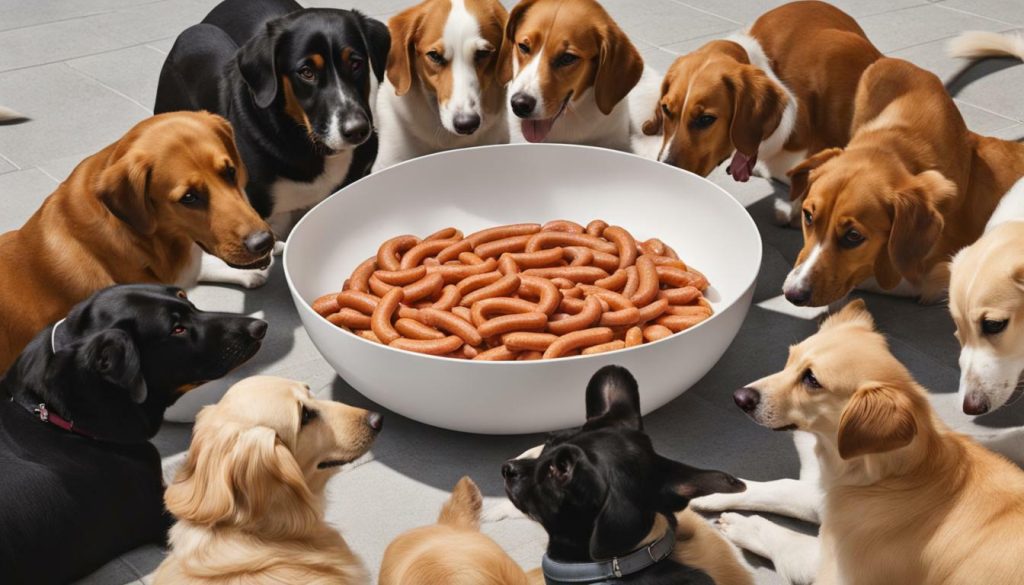
It’s important to remember that Vienna sausages are unsafe for dogs. They contain ingredients that can be toxic to dogs, have high sodium content, and often contain preservatives and additives that can lead to health problems. Instead, choose healthier meat options that provide the necessary nutrients for your dog’s well-being. As a responsible pet owner, you must research and understand which foods are safe for your dog to consume and avoid giving them Vienna sausages or other unhealthy human foods.
Conclusion
In conclusion, Vienna sausages should not be included in a dog’s diet due to the various risks they pose to their health. These sausages may contain toxic ingredients like garlic powder or onion powder, which can harm dogs. Moreover, the high sodium content in Vienna sausages can lead to dehydration and bloating in dogs. At the same time, preservatives and additives can contribute to heart disease and other health issues.
Furthermore, Vienna sausages are high in fat and calories, which can result in weight gain and increase the risk of organ-related illnesses in dogs. Pet owners must prioritize their dogs‘ well-being by opting for healthier meat options such as chicken, turkey, beef roast, or lean ground beef. These alternatives provide necessary nutrients without the added risks associated with Vienna sausages.
Pet owners must research and understand which foods are safe for their dogs to consume. They should avoid giving their dogs Vienna sausages or other unhealthy human foods that can adversely affect their health. Responsible pet ownership includes providing a balanced and nutritious diet to ensure our beloved furry companions’ overall well-being and longevity.
FAQ
Can dogs eat vienna sausages?
No, vienna sausages are not safe for dogs to eat.
Why are vienna sausages not safe for dogs?
Vienna sausages may contain toxic ingredients for dogs, such as garlic powder or onion powder. They are also high in sodium and often contain preservatives and additives that can lead to health problems.
What are the potential risks of feeding dogs vienna sausages?
The high sodium content in vienna sausages can cause dehydration and bloating in dogs. The preservatives and additives can also contribute to health issues like heart disease. Additionally, the high fat and calorie content can lead to weight gain and increase the risk of organ-related illnesses in dogs.
What are healthier meat options for dogs?
It is recommended to feed dogs foods such as chicken, turkey, beef roast, and lean ground beef as healthier meat options.
Why is responsible pet ownership important in regard to feeding dogs?
Responsible pet ownership includes researching and understanding which foods are safe for dogs to consume. It also involves avoiding unhealthy human foods, like vienna sausages, that can have adverse effects on a dog’s health.



